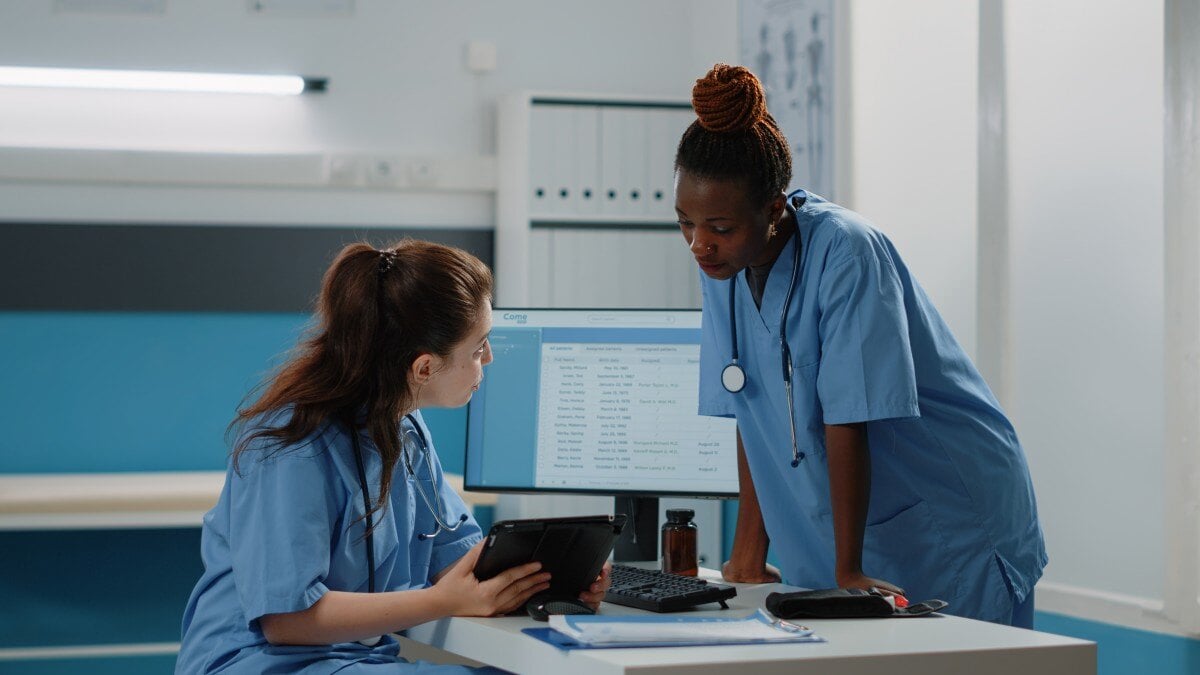Using Patient Education Videos to Support Preventive Care Strategies
As a healthcare provider, you know prevention saves lives. From routine screenings and lifestyle counseling to vaccinations and early detection,...
5 min read
Robert McDermott Aug 29, 2024 12:18:00 PM
 There are, undoubtedly, countless challenges to running a successful healthcare practice. Unfortunately, some of those challenges may be self-inflicted via inefficient healthcare workflows. While some practices focus on patient acquisition and retention, which are invaluable, healthcare workflow inefficiencies can actually boost patient experience.
There are, undoubtedly, countless challenges to running a successful healthcare practice. Unfortunately, some of those challenges may be self-inflicted via inefficient healthcare workflows. While some practices focus on patient acquisition and retention, which are invaluable, healthcare workflow inefficiencies can actually boost patient experience.
Ultimately, workflow bottlenecks and challenges can be avoided and, more than that, the right solutions can actually improve staff productivity, workflow efficiency, and RCM.
Quick Links:
Healthcare workflow efficiency is crucial for revenue cycle management (RCM) because it directly impacts the financial health of healthcare organizations. An efficient workflow ensures all processes—from patient registration and insurance verification to billing and claims management—are streamlined and synchronized.
When workflows are optimized, tasks are completed with fewer errors, reducing delays in billing and claims processing. This results in faster reimbursements, improved cash flow, and overall financial stability for the healthcare provider.
However, it’s about more than revenue. Efficient workflows help minimize administrative burdens allowing healthcare staff to focus more on patient care rather than being bogged down by complex, time-consuming tasks. As a result, administrative staff members are less likely to burn out and more likely to report increased job satisfaction. And, there has been a reported correlation between job satisfaction and patient outcomes which means enabling staff to complete tasks has benefits outside efficiency.
In the context of RCM, workflow inefficiencies can lead to significant financial losses. Errors in coding, billing, or claims submission can result in denied or delayed payments, which can be difficult and costly to correct. In contrast, investing in healthcare workflow software that automates and optimizes these processes, can help healthcare practices reduce the risk of errors, improve accuracy, and ultimately enhance their financial performance.
 How Healthcare Workflow Impacts RCM
How Healthcare Workflow Impacts RCMHealthcare workflow plays a pivotal role in the effective RCM. It can directly influence how smoothly and efficiently revenue is generated and managed within a healthcare practice. When the essential workflow processes, like scheduling and billing and collections, are streamlined, RCM functions like a well-oiled machine.
One of the key ways workflow impacts RCM is through the reduction of errors and bottlenecks. Inefficient workflows often lead to mistakes in coding, incomplete patient data, and delayed claims submissions—issues that can significantly slow down the revenue cycle. For example, if patient information is recorded incorrectly, it can lead to billing errors that delay payments or result in claim denials.
In contrast, practices that automate and optimize these workflows ensure data is captured correctly from the start, are able to reduce the likelihood of errors and improve the speed and accuracy of billing and claims processes.
Further, an efficient healthcare workflow enhances communication and coordination across different departments. For RCM to be effective, there must be seamless integration between clinical operations, administrative tasks, and financial management. When workflows are disjointed or manual, critical information can fall through the cracks, leading to inefficiencies and revenue leakage.
One of the top challenges to healthcare workflow support is the complexity of healthcare regulations and coding requirements. With ever-evolving policies and standards, such as those imposed by CMS or payer-specific guidelines, healthcare practices must continuously adapt their workflows to stay compliant. This complexity often leads to errors in billing and coding, which can result in claim denials, delayed payments, and ultimately, revenue loss.
Another significant challenge is the integration of disparate systems within a healthcare practice. Many providers use a variety of software solutions for different functions, such as Electronic Health Records (EHR), billing systems, ePresribing software and practice management software. If these systems do not communicate effectively, it can lead to fragmented workflows, data silos, and duplication of effort.
For example, patient data may need to be manually entered into multiple systems, increasing the risk of errors and slowing down the RCM process. In contrast, automated data offers an accuracy rate of 99.959% to 99.99%. In contrast, manual data entry has an error rate of 1-5% which can have a significant impact on accuracy across systems. This not only hampers workflow efficiency but also makes it difficult to obtain a holistic view of the revenue cycle, complicating financial decision-making and forecasting.
Another critical challenge for many practices is staffing shortages and high turnover rates. When healthcare organizations are understaffed or dealing with high employee turnover, the consistency and quality of workflows can suffer. New or temporary staff may not be fully trained on existing processes, leading to mistakes and inefficiencies.
And, as noted earlier, the additional workload on existing staff can lead to burnout, further exacerbating healthcare workflow inefficiencies and increasing the likelihood of revenue leakage. The right healthcare workflow software and solutions can help you overcome these challenges while also alleviating administrative burdens and RCM bottlenecks.
Implementing effective healthcare workflow solutions is essential for boosting efficiency and optimizing RCM. Adopting advanced technologies and streamlined processes can help healthcare practices enhance the accuracy and speed of their RCM activities, ultimately improving their financial performance. Below are some key strategies and best practices to achieve these goals.
Best Practice- Automate repetitive tasks such as appointment scheduling, insurance verification, patient registration, and claims submission.
Impact- Automation reduces the likelihood of human error, speeds up processing times, and frees up staff to focus on more complex tasks that require their expertise.
Best Practice- Ensure all healthcare IT systems, including EHR, billing systems, and practice management software, are fully integrated.
Impact- Seamless integration allows for the real-time exchange of information across departments, eliminating data silos and ensuring all relevant information is accessible when needed. This leads to faster decision-making and fewer errors in the RCM process.
Best Practice- Develop and implement standardized workflows across the organization, ensuring all staff follow the same procedures for tasks such as coding, billing, and claims management.
Impact- Standardization reduces variability in processes, which minimizes errors and improves the consistency and reliability of RCM outcomes.
Best Practice- Provide ongoing training and education for staff to ensure they are up-to-date with the latest healthcare regulations, coding standards, and workflow software features.
Impact- Well-trained staff are more efficient and less likely to make costly mistakes. Continuous education also ensures employees can effectively use new tools and technologies, maximizing the benefits of workflow solutions.
 Practice Analytics and Reporting
Practice Analytics and ReportingBest Practice- Utilize data analytics tools to monitor and analyze workflow efficiency and RCM performance. Regularly review key performance indicators (KPIs) such as claim denial rates, days in accounts receivable, and collection rates.
Impact- Data-driven insights allow healthcare organizations to identify bottlenecks, inefficiencies, and areas for improvement. By addressing these issues proactively, organizations can optimize their workflows and enhance their RCM outcomes.
Best Practice- Implement patient portals and automated communication tools to engage patients in their care and keep them informed about billing, payment options, and insurance coverage.
Impact- Improved patient engagement leads to better-informed patients, which reduces the likelihood of billing disputes and enhances the overall patient experience. Clear communication also ensures patients are more likely to pay their bills on time, positively impacting the revenue cycle.
Best Practice- Conduct regular audits of workflows and RCM processes to identify inefficiencies and areas for improvement.
Impact- Audits provide valuable feedback on the effectiveness of current workflows and highlight opportunities for optimization. By continuously refining workflows, healthcare organizations can stay agile and responsive to changing industry demands.
Successful implementation of these healthcare workflow solutions helps healthcare practices significantly boost their operational efficiency, reduce errors, and enhance their RCM processes. This, in turn, leads to better financial health, improved patient care, and a more sustainable healthcare operation overall.
And, when that healthcare workflow platform integrates seamlessly with your existing practice management software, you can see the impacts on efficiency, productivity, accuracy, and RCM without sacrificing the systems you already love.
iCoreConnect developed its iCoreEnterprise platform with those needs in mind. WIth unparalleled support to ensure you get the most out of your software tools, we’d love to show you exactly what our iCoreEnterprise and its components can do for your practice. Reach out and book a demo with our team today.

As a healthcare provider, you know prevention saves lives. From routine screenings and lifestyle counseling to vaccinations and early detection,...

There’s no denying that the AI boom is here. The American Medical Association reports that 66% of physicians are currently using artificial...

If only managing your practice’s revenue cycle came with a crystal ball. You could spot claim denials before they happen, predict when patients might...

If you took a snapshot of the registration and check in area of a healthcare practice, even in 1990, it would look markedly different today. Gone are...

One of the most amazing and impactful aspects of healthcare services is how they’re individualized for the unique needs of every patient. However,...

When we discuss improving healthcare and improving the patient experience, we often focus on treatments, emerging research, and ensuring quality...